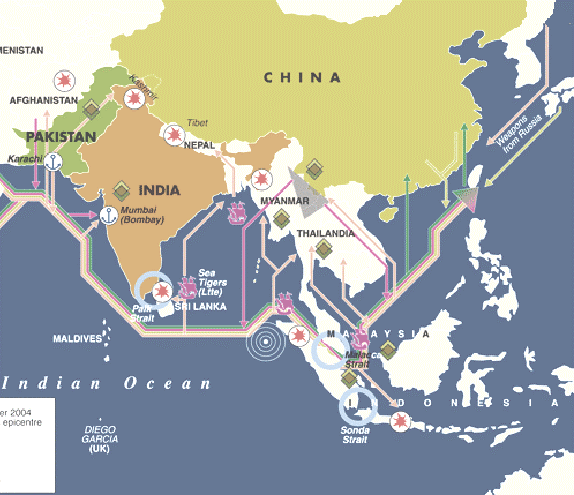India should increase presence in Indian Ocean Region
 New Delhi, Dec 7 : India should increase its presence in the Indian Ocean Region, through which most of its energy and trade supplies pass, in order to compete with China and not get worked up on the land border issue, feel experts.
New Delhi, Dec 7 : India should increase its presence in the Indian Ocean Region, through which most of its energy and trade supplies pass, in order to compete with China and not get worked up on the land border issue, feel experts.
The Indian Ocean Region (IOR), which straddles from Africa to Australia, is the region where India needs to yield influence as energy security is needed to sustain high growth rate, the analysts said at a seminar organised by the National Maritime Foundation.
Eighty percent of China's and 65 percent of India's oil is shipped through this region.
"The Indian Ocean Region is our theatre of competition with China and not the border. So we should not get excited about the Line of Actual Control, but should focus more on the IOR," Nitin Pai, expert on strategic affairs and a fellow at the Takshashila Institution, said at the seminar.
Pai was referring to the recent media hype over reported Chinese incursions across the Line of Actual Control (LAC), the de facto border between the two countries.
"The IOR is important because most of our energy and trade supplies flow through it and needs to be protected... We need to be ready to redeploy our forces to protect our strategic interests, especially as China continues to play its strategic games," Pai added.
The IOR, the third largest body of water in the world and with 33 littoral states, is strategically important as a large percentage of global trading ships pass through it.
China has been increasing its presence in the IOR by following what is popularly termed as the "Strings of Pearl" strategy of encircling India by investing in assets and ports in Pakistan, Myanmar, Sri Lanka and Bangladesh.
Other experts said Indian influence in the region has dwindled over the years.
"India has allowed its influence generated post the 2004 tsunami to dilute due to its continued absence in Southeast Asia and the region," said National Maritime Foundation's director Commodore (retd.) Uday C. Bhaskar.
When the tsunami struck in December 2004, in which India suffered over 15,000 deaths and vast destruction, the Indian Navy was quick to rush aid to the Maldives as well as the worst-hit Sri Lanka and Indonesia.
About 1,000 Indian relief personnel and five naval ships were sent to Trincomalee, Galle and Colombo ports in Sri Lanka, with medical teams and immediate relief material.
"China has emerged as a key economic partner for most Asian economies, including Japan and South Korea. It has overtaken India as an economic partner of South and Central Asian economies as well, and is well on its way to emerging as a major economic partner for African countries," Sanjaya Baru, former media advisor to the prime minister, said.
"Force projection is of utmost importance. We are visible in East Africa due to our successful anti-piracy missions. We have to show our presence in the Indian Ocean Region by rethinking the way we deploy our forces," Baru added.(IANS)